Menopause is a natural part of aging and marks the end of the female reproductive years…
With the number of menopausal women worldwide estimated to reach 1.1 billion by 2025, you’d think that we would be able to talk openly about menopause, but this fundamental part of a woman’s life is still stigmatized.
According to Dr. Stacy Sims, all women experience these menopausal changes, but continuing to run puts you ahead of the pack in terms of coping with the menopausal symptoms.
On that note, let’s have a look at what happens to your body during menopause and the effects running will have on the dreaded menopausal symptoms…
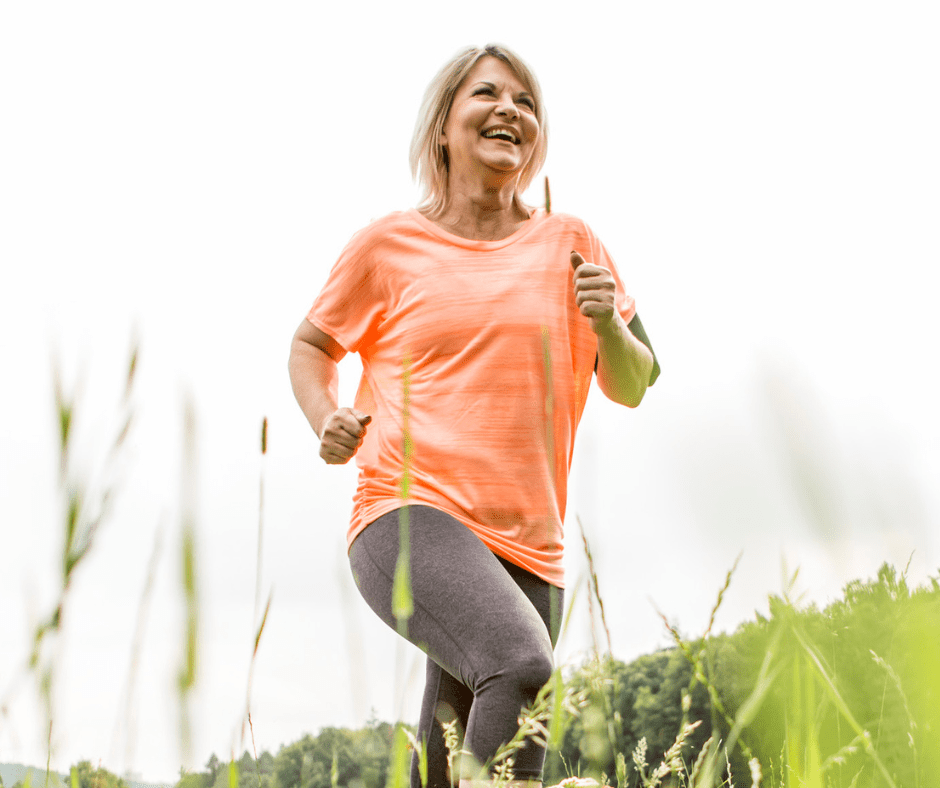
What Happens To Your Body During Menopause
Menopause is defined as a complete year without menstrual bleeding.
During perimenopause, your ovaries make less of the hormone estrogen. When this decrease occurs, your menstrual cycle starts to change, until eventually, it stops.
Physical changes can also occur as the symptoms of menopause, these changes are due to the hormonal changes your body is experiencing.
These symptoms may vary according to which stage of menopause you are in. The three stages are perimenopause, menopause, and postmenopause.
Estrogen and progesterone are the primary female hormones related to reproduction.
When ovarian function declines with age, ovulation doesn’t occur regularly. This leads to irregular or missed periods.
Eventually, the ovaries stop ovulating altogether, and periods stop completely. This results in lower levels of estrogen and progesterone production by your ovaries.
It’s important to remember this is a normal process.
Menopause requires no medical treatment. Instead, treatments that are on offer focus on relieving your signs and symptoms…
Menopause Symptoms
Here are some of the symptoms of menopause that will affect your running, they should certainly not stop you from continuing to run… we will get to the reason why in a little bit…
- Hot Flushes
- Weight Gain
- Emotional Changes
- Insomnia
- Night Sweats
- Incontinence
- Slowing Down
Hot Flushes
These are a sudden feeling of heat and sweating in the upper part of your body, on your neck chest, and face… no one knows exactly what causes them.
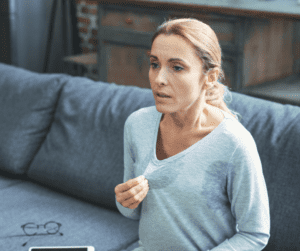
According to this scientific paper: Hot flushes affect up to 80% of women during the menopausal transition and persist for 5 or more years past menopause in up to a third of women.
The cause of these common symptoms is currently unknown, although alterations in thermoregulation probably play a role.
Several recent studies have suggested that hot flushes may be associated with higher levels of oxidative stress as well as adverse vascular changes during menopause.
According to this study…
Hot flashes and night sweats involve the central thermoregulatory system in the hypothalamus and are mediated through autonomic control of the peripheral vasculature and sweat glands.
Therefore, the onset intensity of the hot flushes and night sweats may represent differences in underlying dysfunction in central and autonomic mechanisms and may involve other brain regions associated with sleep and mood.
The characterization of autonomic function associated with the expression of hot flashes and night sweats has not been fully characterized. However, heart rate decreases in menopause and sleep-related decreases in blood pressure are not observed in women who experience hot flashes with insomnia.
In addition to menopausal hormone treatments, selective serotonin reuptake inhibitors also are effective in reducing hot flashes in women.
Weight Gain
Many women going through menopause gain weight around their abdomen… This is due to the declining estrogen levels, age-related loss of muscle tissue, and lifestyle factors such as following a bad diet and a lack of exercise.
Emotional Changes
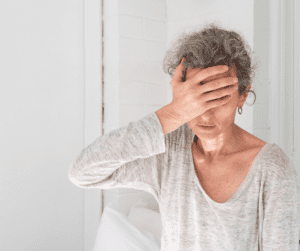
Mood swings… Anxiety… Depression …
These symptoms can be scary for a lot of women – Especially if they feel like they are on this journey alone and when society doesn’t allow us to talk about these as actual symptoms of menopause and rather just something women are dealing with and “being emotional”.
The change is real and physiological…
According to the North American Menopause Society (NAMS), close to 23 percent of women go through mood changes before, during, or after menopause.
Up to 70 percent of women describe irritability and being annoyed at things that never used to bother them before as one of the main emotional symptoms of perimenopause.
This next stat is very real and should be taken very seriously.
Depression affects up to 1 out of every 5 women going through menopause.
Insomnia
Insomnia is the inability to sleep. It can also contribute to mood changes, as well as weight gain, high blood pressure, and even in some cases diabetes.
40-50 percent of women experience sleep disturbances during menopause.
Night Sweats
Simply put, night sweats refer to excess sweating during the night.
For women going through menopause, night sweats are intense hot flashes that occur at night, they can drench your clothes and sheets (not related to an overheated environment) and disturb sleep which in turn affects mood and recovery.
Incontinence
Urinary incontinence (UI) is also known as loss of bladder control or involuntary urinary leakage.
It is a common problem in the female population with prevalence rates varying between 10% and 55% in 15- to 64-year-old women.
Urinary incontinence is extremely common but not normal.
For menopausal women, it’s not just loss of strength but also changes in ligaments and other connective tissues composition
In this article, we provide An Expert’s Guide To Dealing With Leaking Urine While Running
Last but not least, if you are already a runner, this is a symptom you’ll notice and most probably one of the reasons you are reading this article…
Slowing Down
The number one reason for slowing down is the loss of lean muscle mass. This loss starts as early as your 30s and you can lose around 3% of muscle mass each decade.
Research suggests that a lack of the correct nutrition, decreased muscle synthesis, fluctuating hormones, loss of muscle strength, and not enough recovery time – also contribute to a slower running pace.
BUT…
With the right training framework consisting of strength training, recovery, consistency, nutrition, and intensity/pace training, women going through menopause can run faster than they ever did before.
How To Run Faster Through Menopause
5 Reasons Why You Should Continue Running Through Menopause
Something to remember: all the benefits that you would gain from running that positively affect your physical and mental wellbeing still apply.
- Running Makes Your Bones Healthy
Our bone mass peaks around the age of 30 and we lose a little every year, there’s a sudden surge in that loss once menopause is reached.
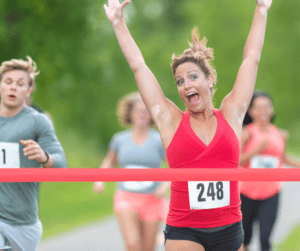
The goal would be to start early so that the decline isn’t dramatic.
Note: IT IS NEVER TOO LATE TO START!
Doing physical activity such as running brings a lot of advantages but one of the amazing benefits that you get for free, when you train regularly is good bone health.
Good bone health implies a little bit of strength, but also bone mineral density. Our bones support us and allow us to move. Our bones also store minerals such as calcium and phosphorous, which help keep our bones strong, and release them into the body when we need them for other uses.
Bones require a load on them to absorb that calcium and get stronger. Yes, running is placing a load on your bones but your bones require a multi-directional load on them to really help that mineral bone density. This is where resistance training comes into play.
Bone Health: What You NEED To Know As You Get Older
- Strength Training Builds Muscle
In the same way, as our bone mass reduces as we age, we lose muscle mass too.
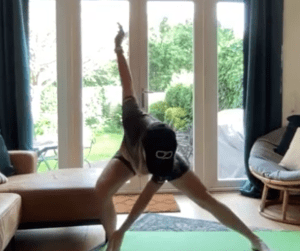
As we reach around the age of 50, we notice that there’s this exponential loss of strength and that’s really why we start getting slower as a runner.
Resistance training can reverse some of the aging processes and increase your lean muscle mass. Pushing your body against a form of resistance can be bodyweight, bands, weights, etc…
If you want to stay injury-free and keep running to and through menopause, then strength training is non-negotiable.
Strength training is extremely important for runners, for two main reasons. The first is for injury prevention, and the second is to improve your running performance and make you a faster and more efficient runner
The key however is in the type of strength training that you are doing… The type we are talking about that is vital for peri- and postmenopausal women is resistance training and high-intensity interval training.
Resistance Training: Increases muscle strength by making your muscles work against a weight or force.
Here at Coach Parry, we’re massive advocates of strength training. We’ve put together this free strength training plan for runners that you can do once a week, at home and with no expensive equipment needed. You can access it by clicking here.
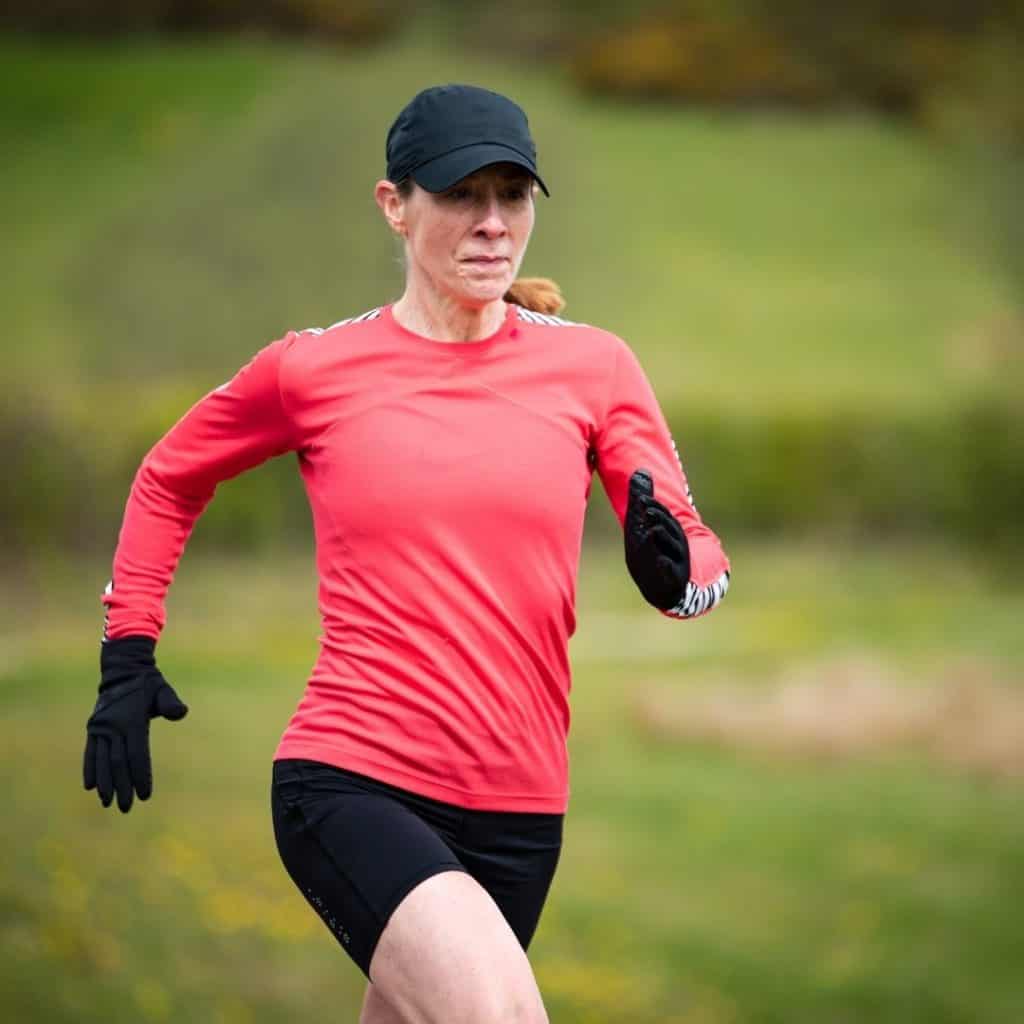
Join us for a free online presentation of the…
The Running Through Menopause Masterclass
…and discover how you can run well (and faster) as you get older, without training more or harder than you currently are, all while avoiding injury.
If it feels like you’re training harder than ever but not running the paces you’d like to be running or if you’re constantly tired, fatigued or running in some sort of pain, then this is specifically for you.
Save Your Seat In This Training Now…
- Running Improves Your Mood

A lot of research has proven that when you run or even walk, endorphins and serotonin are released in your body, these are the chemicals in your brain that improve your mood.
Mood changes are so prevalent and running is extremely helpful with this all around.
Fresh air, Vitamin D (if running outside in a country with the sun), and of course the physiological benefit…
Research has revealed that endorphins may not have too much to do with a runner’s high but in fact, it points to another type of molecule: endocannabinoids.
These act on your endocannabinoid system. This is the same system that’s affected by tetrahydrocannabinol (THC), the active compound in cannabis.
Like endorphins, exercise releases endocannabinoids into the bloodstream. If you feel euphoric or deeply relaxed after a run, these molecules are the reason why.
- Running May Reduce Menopause Symptoms
There’s growing evidence that the horrible symptoms experienced from menopause may be reduced by running in some women…
It has been proven that running can improve the quality of your sleep and help you sleep through the night. Some, but not all, research studies have shown that exercise training can reduce the frequency of hot flushes experienced during menopause as well as improve the symptoms of anxiety.
Note: This science is not foolproof and this is not a blanket approach for all women.
- Running Is a Fun Way To Meet People
Making friends as an adult can be difficult. Add the emotional rollercoaster of menopause to the mix… Maybe even a pandemic and it’s a big challenge…
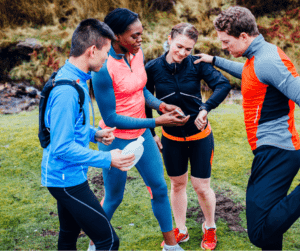
Joining a running group or teaming up with a running buddy is an easy way to make friends and meet new people, They may just help make this journey a bit easier for you.
In summary, It’s not always easy to get out there and go for a run, but even if you head out for a short walk… it’s always worth it.



Comments are closed.